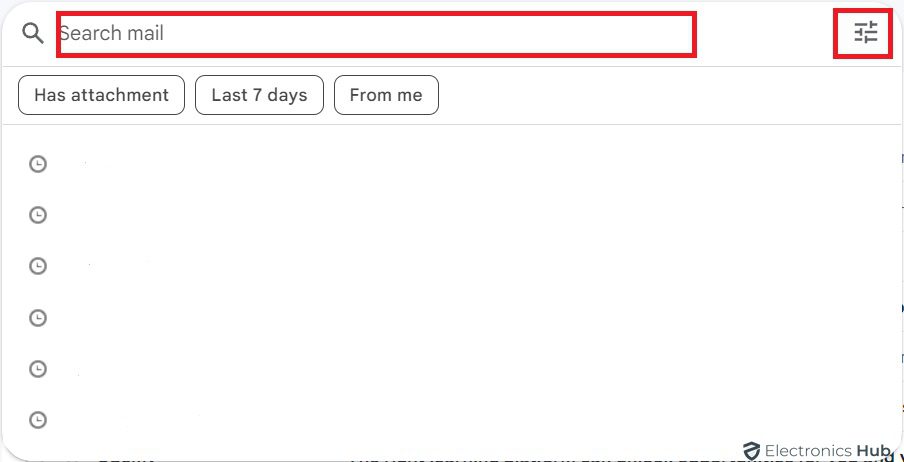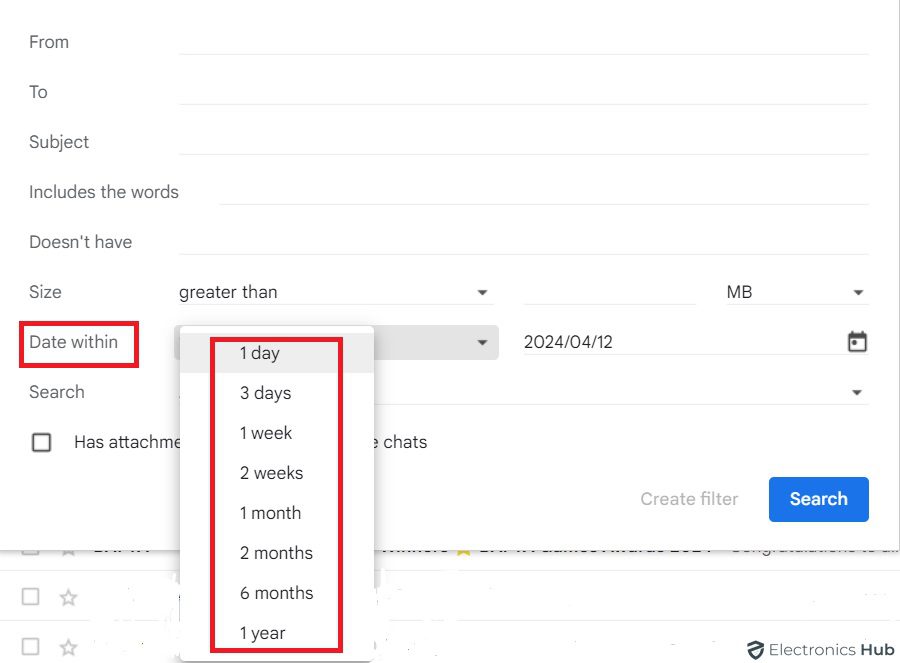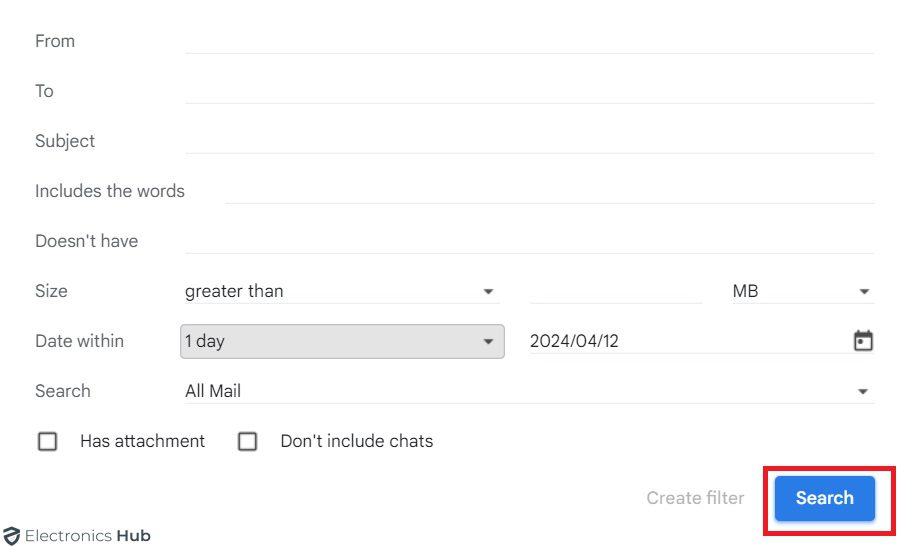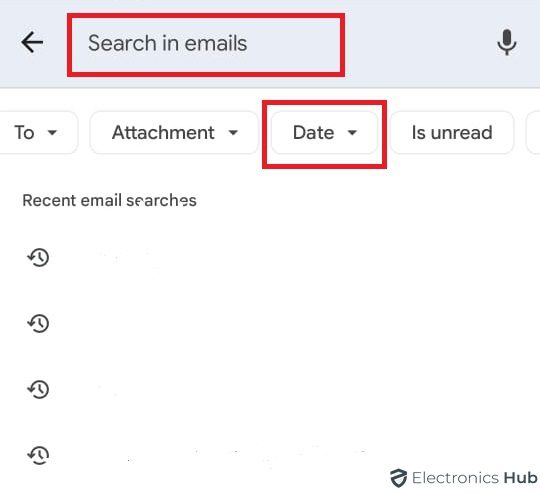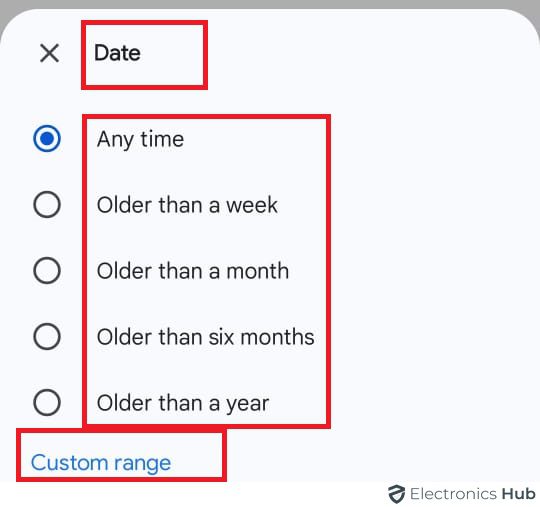Finding past emails can be a challenge, especially if you don’t recall the exact sender or subject line. Luckily, Gmail has robust search functionalities that go beyond keywords. You can also search for emails based on specific dates as well. Whether you have a certain date in mind or need to search within a timeframe, date-based search operators can help you find emails in your Gmail account.
Before proceeding first, let’s understand the importance of searching Gmail by date.
- You can easily find emails based on when they were sent or received.
- This feature is particularly useful when you’re trying to find a specific message from a certain time or when you want to clear out old emails.
- And you can also streamline your email management process and save valuable time.
- Sorting emails by date can assist in organizing your inbox chronologically, making it easier to manage and prioritize your emails.
- Track trends in your email activity, such as peak times for receiving messages or more interaction with specific contacts or groups.
- Helps to identify and filter out spam or other unwanted messages that have accumulated over time.
Outline
ToggleHow To Search Gmail By Date?
Here are the most common ways you can use Gmail’s date search filter to easily locate old emails.
1. Using “after:” operator
This operator retrieves emails received after a specific date. For example, to see emails sent after December 1st, 2023, enter after:2023/12/01 in the search bar.
2. Using “before:” operator
This operator retrieves emails received before a specific date. For example, if you want to retrieve emails received before February 14th, 2024, enter before:2024/02/14 in the search bar.
3. Combining date operators (after & before)
You can combine both after and before operators for a more precise search. For example, to find emails sent between March 1st and April 1st, 2024, enter after:2024/03/01 before:2024/04/01 in the search bar.
4. Using “on:” operator
This operator retrieves just emails received on that specific day. For example, to get emails received on April 5th, 2024, type on:2024/04/05 in the search area.
5. Combining keywords with dates
Suppose you’re looking for an email from Sarah about a project received in February 2024. Enter from:Sarah AND after:2024/02/01 before:2024/03/01 (remember to adjust the year if needed). This narrows your search to emails from Sarah that include the term “project” during the selected timeframe.
6. Using “from:” operator
Imagine searching for emails from “John” received after March 1st, 2024. Use from:John after:2024/03/01. This narrows down your search to emails from John within that timeframe.
7. Using specific keywords
Let’s say you’re looking for emails about “travel” received before February 14th, 2024. Enter travel before:2024/02/14. This searches for emails containing “travel” received before Valentine’s Day.
8. Using specific tags
Perhaps you’re searching for “important” emails received on April 1st, 2024. Use label:important on:2024/04/01. This retrieves important emails received on that specific date.
9. Using “older than” operator
This operator allows you to search for emails older than a specific timeframe. It could be 1 day, 1 week (or) 1 month. Simply type “older_than:” followed by a number and a time unit (e.g., days, weeks, months) in the search bar. For example, if you want to search for emails older than 1 month, type “older_than:1m” in the search box.
10. Using “newer than” operator
With this, you can search for emails newer than a specific timeframe. Type “newer_than:” followed by a number and a time unit. For example, “newer_than:2w” will display emails received within the past two weeks.
11. Using “is:important” operator
This operator lets you search for emails marked as important within a specific timeframe. For example, “is:important after:2022/01/01 before:2022/12/31” will display important emails received between January 1, 2022, and December 31, 2022.
How To Search Emails With Gmail’s “Advanced Search”?
Here’s how to use “Advanced search” to discover emails on your computer or Mac:
1. Login to your Gmail account.
2. Enter a keyword in the search bar.
3. Click “Advanced search”.
4. To choose a date, use Gmail’s Date Within filter.
5. Choose a date range (eg; 1 week, 1 month, or 1 year). You can also use other parameters to narrow your search. Filter by recipient, sender, subject, size, or keywords as needed.
6. When you’re ready, hit the “Search” button. Gmail will then display only the emails that meet your criteria.
How To Search By Date In The Gmail App?
Via Android phone and iPhone
1. Open the Gmail app.
2. Tap the search bar at the top of the screen.
3. Below the search bar, you’ll see a section titled “Date.”
4. Tap on “Date” to reveal a dropdown menu with preset date ranges like “Past week,” “Past month,” or “Past year.”
Selecting a preset range will automatically populate the search bar with the corresponding date operators (e.g., “after:2024/03/31 before:2024/04/07” for “Past week”).
After selecting a preset date range from the dropdown menu, you can further refine your search by adding keywords directly into the search bar.
5. Tap the search icon to view emails received within that timeframe.
How To Fix Issues When Searching Gmail By Date?
Although using Gmail to search by date might be quite useful, there are a few common problems that users may run into. Here are some common issues and solutions:
1. Incorrect Date Format
Using the correct date format is crucial for accurate results when searching Gmail by date. Just a friendly reminder to make sure you’ve got the date format correct. It’s best to use the “YYYY/MM/DD” format consistently.
2. Overwhelming Search Results
When searching by date, you may be faced with a high volume of results, which can make it hard to find the exact email you need. Try incorporating different search operators or keywords to refine your search and make it more focused.
3. Inability to Search by Time
Gmail’s search-by-date feature only allows searching by day, without the ability to specify specific times. If you’re looking to find emails within a specific time range, you might want to try using a third-party tool that provides more advanced search options.
Frequently Asked Questions
Ans: Here are some possible scenarios:
*Find receipts or invoices for specific tax periods.
*Track project timelines through email communication.
*Review past agreements or contracts exchanged via email.
*Recall specific conversations you had on a particular date.
Ans: Unfortunately, Gmail search operators don’t extend to time-specific searches within a day. You can only search by date or a date range.
Ans: Gmail will display an error message indicating the format is invalid. The correct format is YYYY/MM/DD (year/month/day).
Conclusion
Finally, understanding how to search Gmail by date will make it easier to find the emails you need. Let’s make sure your inbox stays nice and tidy! Use the step-by-step guide, take advantage of advanced search options, keep things organized with labels and folders, and follow best practices. Start employing these techniques right away and see the impact of focused email searches!









